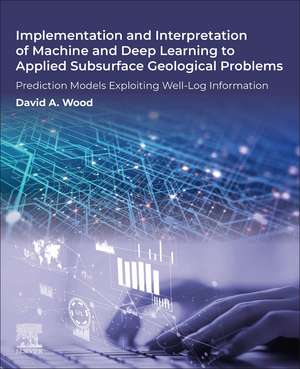Implementation and Interpretation of Machine and Deep Learning to Applied Subsurface Geological Problems: Prediction Models Exploiting Well-Log Information
Autor David A. Wooden Limba Engleză Paperback – 24 feb 2025
Each chapter includes its own introduction, summary, and nomenclature sections, along with one or more case studies focused on prediction model implementation related to its topic.
- Addresses common applied geological problems focused on machine and deep learning implementation with case studies
- Considers regression, classification, and clustering machine learning methods and how to optimize and assess their performance, considering suitable error and accuracy metric
- Contrasts the pros and cons of multiple machine and deep learning methods
- Includes techniques to improve the identification of geological carbon capture and storage reservoirs, a key part of many energy transition strategies
Preț: 778.34 lei
Preț vechi: 1020.47 lei
-24% Nou
Puncte Express: 1168
Preț estimativ în valută:
148.98€ • 161.88$ • 125.23£
148.98€ • 161.88$ • 125.23£
Carte disponibilă
Livrare economică 24 martie-07 aprilie
Preluare comenzi: 021 569.72.76
Specificații
ISBN-13: 9780443265105
ISBN-10: 0443265100
Pagini: 442
Dimensiuni: 191 x 235 mm
Greutate: 0.45 kg
Editura: ELSEVIER SCIENCE
ISBN-10: 0443265100
Pagini: 442
Dimensiuni: 191 x 235 mm
Greutate: 0.45 kg
Editura: ELSEVIER SCIENCE
Cuprins
1. Regression models to estimate total organic carbon (TOC) from well-log data
2. Predicting brittleness indexes in tight formation sequences
3. Classifying lithofacies in clastic, carbonate, and mixed reservoir sequences
4. Permeability and water saturation distributions in complex reservoirs
5. Trapping mechanisms in potential sub-surface carbon storage reservoirs
6. The accurate picking of formation tops in field development wells
7. Assessing formation loss of circulation risks with mud-log datasets
8. Delineating fracture densities and apertures using well-log image data
9. Determining reservoir microfacies using photomicrograph and computed tomography image data
10. Characterizing coal-bed methane reservoirs with well-log datasets
2. Predicting brittleness indexes in tight formation sequences
3. Classifying lithofacies in clastic, carbonate, and mixed reservoir sequences
4. Permeability and water saturation distributions in complex reservoirs
5. Trapping mechanisms in potential sub-surface carbon storage reservoirs
6. The accurate picking of formation tops in field development wells
7. Assessing formation loss of circulation risks with mud-log datasets
8. Delineating fracture densities and apertures using well-log image data
9. Determining reservoir microfacies using photomicrograph and computed tomography image data
10. Characterizing coal-bed methane reservoirs with well-log datasets
